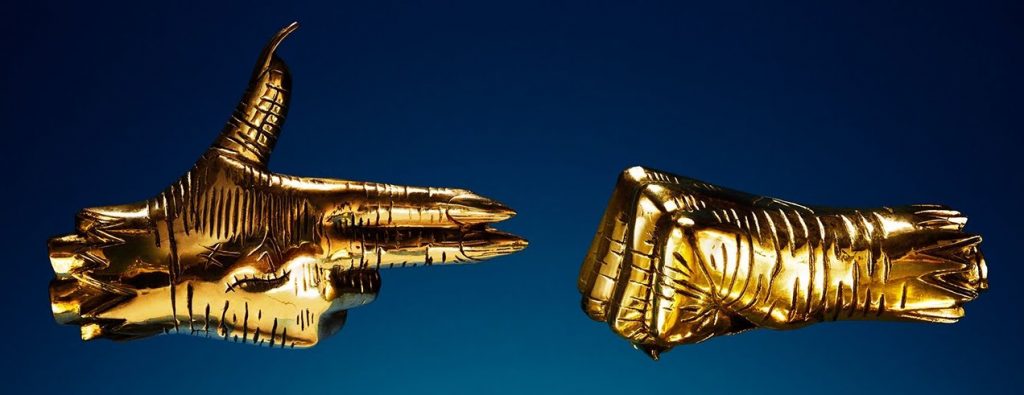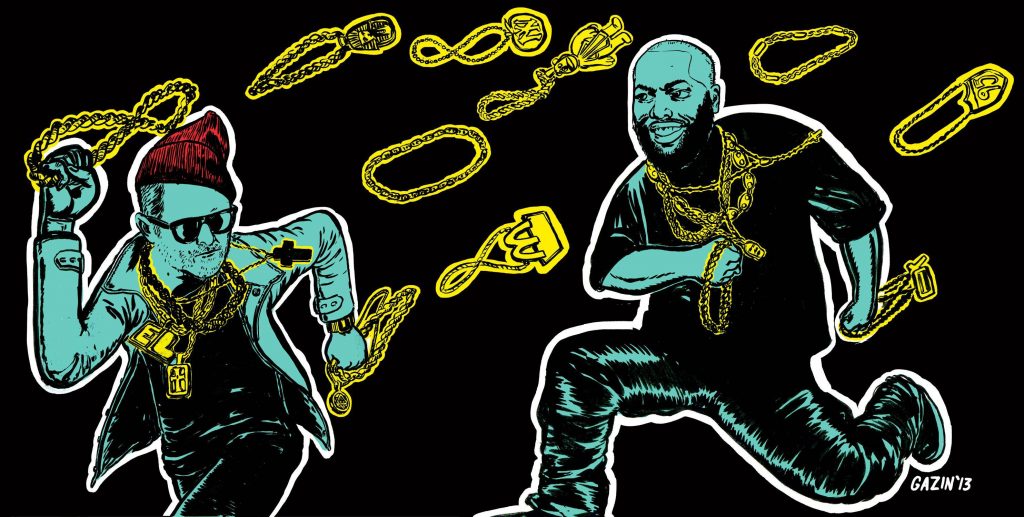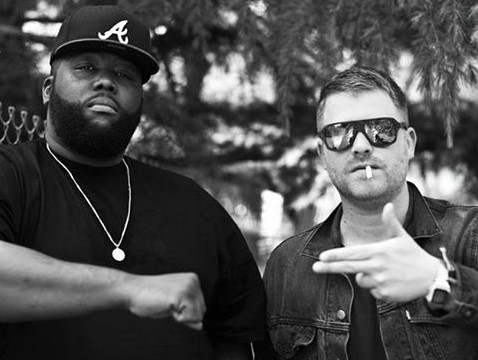Alex writes about the new Run the Jewels record, how it’s different from the previous, and why that shouldn’t bother him.
When a piece of media comes along that you are excited to consume, said media naturally takes upon a whole different set of expectations than something you merely stumbled upon. The most pertinent examples for me are always director-based: when I saw Silence, I wasn’t merely seeing a new movie. I was seeing a new movie that was directed by a cinematic deity. Add to that the further pressure of Silence being a long-gestating passion project for Martin Scorsese, and I walk into the cinema ready to see a film that Scorsese has thought about in some capacity for over twenty-five years. Almost nothing could possibly live up to that level of expectation. I knew too much.
One thing I have spent my entire life avoiding is learning basically anything about the production or reading or understanding of music. I realized relatively early that as I learned more about cinema, I reacted less emotionally to the movies I was watching; when you can see behind the metaphorical curtain, you start to realize the Wizard isn’t all that imposing. He’s just a dude doing his job that seems to like wearing scarves on set. As somebody that is interested in cinematic wizardry, I consider this a worthy trade-off, but I do not approach all art forms similarly.
With music, I have tried to remove myself from learning much about it; I have always loved music in the same way I love movies and NBA basketball, but I have no use for time signatures and timbres. If asked to name the definition of melody, I think I could do it, but I remain unclear. I never want to know specifically what those various wizards I adore are doing; I’ll always read about their craft, and I’ll learn enough that I can bullshit and use terms like “punch in” or “guitar tones” to seem informed, but I’ll never quite picture it properly.
What this allows is an occasional level of absurd excitement when I hear something new that I love immediately. Radiohead’s Ful Stop is a recent example, a song that made me think I was living in a nightmare scored by unprecedentedly wonderful guitar tones. Kanye got me with The College Dropout and Late Registration, and then five years later with My Beautiful Dark Twisted Fantasy. I was flummoxed by Vince Staples’ Summertime ’06. And in October 2014, an album I put on merely to wash some plates almost made me smash every one of them.
In short, Run the Jewels 2 is a certified banger. I am not one to immediately denote something a classic album, but as somebody now old enough to understand how music sticks with me through time, I can confidently say RTJ2 will remain in my cold, dead heart until said heart stops functioning. RTJ1 was a good album that I deemed slightly overrated, whereas RTJ2 was the only record I listened to for weeks. It was perfect to run to, perfect to work to, perfect to plan an anarchist potluck to. Killer Mike and El-P had cracked the code.
So, naturally, the promise of Run the Jewels 3 was mildly exciting to me.
When I actually put the new record on, it was immediately intriguing, albeit for less immediate reasons than the pair’s previous outing. Instead of Killer Mike yelling about how powerful his introductory verse was going to be off the top of Jeopardy, the beat to RTJ3’s opener Down does a slow fade in; the beat is amazing, the song is incredible, but Down is indicative of the slightly altered feel of RTJ3 as a record.
The reason Run the Jewels were able to gain the popularity they did was built around the idea that their albums didn’t sound like other hip-hop albums. To say RTJ releases belonged to a genre of their own is hyperbolic and silly, but to say that not a lot of rappers make records under forty minutes – let alone albums that are so persistently aggressive – is unequivocally true. And that’s the core difference between RTJ2 and RTJ3: Run the Jewels 2 sounds like a Run the Jewels record, while Run the Jewels 3 sounds like a normal hip-hop album. A great one, for sure, but different than what came before.
That is not to say the old RTJ is dead and buried: Talk to Me, the second track, is about as Run the Jewels as it gets. El-P beginning his verse with the line “Brave men didn’t die face down in the Vietnam mud so I could not style on you” is equal parts hilarious and visceral, simultaneously offensive and respectful of people willing to die for their country. Go Ticketron is another textbook RTJ jam, for reasons unrelated to the fact that the name Run the Jewels is repeated a comical fourteen times in three minutes. But for much of the album, Run the Jewels feel calmer and more human than they have on past records. There are more songs that feel like Crown and fewer Close Your Eyes (And Count to Fuck) equivalents.
Part of this has to be attributed to the length of the album; you can sprint for the majority of 39 minutes, but when you’re running for 52 minutes you have to jog a bit more. As such, some of the songs on RTJ3 feel slower than what has come previously (even though some hard music-based, Jonah Keri-style analytics might prove this theory wrong). Of course, “It’s longer and I got bored” is not a criticism I’m going to let fly here. RTJ3 is longer than its predecessor, sure, but that is not the real complaint. The problem is that with the shorter length, the chaff begins to jump out a bit from the wheat; songs like Stay Gold and 2100 seem worse simply because they’re 7/10s from a group that didn’t put anything less than an 8 on the last record.
That said, Killer Mike and El-P’s rapping remains at their previously established, continually ridiculous highs. Mike is so well established as a great rapper that this is no surprise; somehow his influence and talent have made El-P even better than he already was. El-P’s flows have gotten more creative, his funniest lyrics funnier, and his level of fuck giving seems to have gone from negative two to negative fourteen. (See the aforementioned line about Vietnam vets, presumably written while he was doing push-ups nude at the edge of cliffs.)
It is admittedly difficult to properly explain why I felt disappointed by RTJ3, especially since I will not be surprised to realize a year from now that it ended up being my favourite album of 2017. The rap fan in me that hears the beats knows they’re almost exclusively bangers, and sees the rhymes similarly. It is simply difficult to break down the difference between making a really good record and one that I will want to hear every year for the rest of my life. (I eagerly anticipate being a sixty-nine-year-old losing his mind to Blockbuster Night Part 1 during a couples’ brunch; that eggs benny won’t know what hit it.)
To figure out this difference, I went back to a thing I (kind of) wrote about Run the Jewels back in 2014, an essay primarily about Donald Sterling and Roger Goodell and house party controversies that never saw the light of day for various reasons.
The best record I’ve listened to this year is clearly Run the Jewels 2. Second place is not close. Killer Mike and El-P have made an album that is the best thing in hip-hop since Kendrick Lamar’s last album, and it will probably stay that way until the release of Kendrick Lamar’s next album*. El-P’s tremendous beats and the rhymes of each create this bizarre space where both chaos and order reign musically. The music simply sounds mean; it makes me want to start a riot for no reason. There is a feeling of anarchy throughout the album, but what sets it apart is that Run the Jewels 2 does not blindly proceed through the path of anarchist thought. It is not a fashion slave protesting simply to get in a Lookbook. Jaime and Mikey know they need reasons for what they do, reasons that are most pointedly described in Early, and we get approximately four hundred motives for the rage throughout the record. El-P’s abstract rhymes paint a bizarre-looking world for this thought to exist within, and then Killer Mike adds the most trenchant of thoughts to the mix.
*This turned out to be a correct prediction.
One of the most obvious things when listening to a modern production by El-P is how doctored every element of the song typically is. There are unanticipated sounds happening constantly, and the psyche of Jaime and Mikey is frequently conveyed by a surprising number of punch-ins. The pair are great rappers, but don’t hold to the old fashioned “breath control” idea; so frequently their songs are borderline impossible to rap exactly the way they exist on record because El-P layers the lines just so. The control that can’t be exerted over real life doesn’t apply to the digital age of production; now we can never run out of things to change**.
**As proven by Kanye West’s reactions to his own release of The Life of Pablo.
In one of the record’s standout tracks – Lie, Cheat, Steal – Killer Mike’s verse brings up the Donald Sterling tape, and addresses one of the most interesting aspects of the Sterling case. Why did Donald Sterling go on television to talk to Anderson Cooper to discuss the tape? He was already widely viewed as a villain, but why did he care about how he was seen? What was to gain from trying? What Killer Mike’s verse describes is that despite Sterling becoming impossibly rich and powerful, there were still things outside of his control. In Killer Mike’s parlance, Sterling remains a “prisoner of privilege.” Sterling still cared about how people thought about him, and he could never be in charge of that. Below is an excerpt of Mike’s verse:
Who the fuck gonna bully me if I got a billi[on dollars]?
If I got a billi and the bitch recording me I’m like ‘Who cares?’
What I wouldn’t be is on TV, stuttering, talking scared
So the question is when Don’s at home with that traitor ass bitch alone,
Who’s that voice on the side of the phone that shakes and rattles his bones?
Could it be the man behind the man behind the man behind the throne?Now, of course there is a silly way to interpret this last line, that there is a dark Illuminati-style shadow group that controls Sterling and tells him to go on television to apologize. But that seems more insane than some of Sterling’s answers to Anderson Cooper. (My first name might be Alex, but my last name is not Jones.) What I prefer to think is that, no matter where one is in their life, be it Donald Sterling, Killer Mike, or me, there are things we have no control over, and things that will always haunt us. Sterling is rich enough and old enough that he shouldn’t give a fuck about his perception. He can create his own world, and kind of has, a world where he’s rich enough to say the racist stuff he’s been saying throughout his career. There is nothing about his life that is truly difficult from the outside looking in, but Sterling still seems to care about the few things he can’t control.
I still think Killer Mike’s Lie, Cheat, Steal verse has yet to be topped in hip-hop since its release in 2014. That level of abstraction is entirely too rare in hip-hop; Killer Mike combines a visceral dash of storytelling, a la Jay-Z’s second verse on D’Evils, and throws in a dash of impossibility like Andre 3000 does on Rosa Parks. And Mike does this all within a real world example, choosing to paint the verse as a treatise on how even when you have everything, you can never truly be the king. There’s always something to worry about.
Something changed with Run the Jewels in the time between RTJ2 and RTJ3. What was once a borderline Rage Against the Machine record with fewer turntable guitar solos became an album about real, human concerns. It became an album that dealt with serious topics like chain-snatching deaths and the ratio of seriousness to jokes about pirates “y’argh”ing contributes to the record as a whole feeling like something different from what came before.
In any interview with Run the Jewels, El-P and Killer Mike invariably end up talking about how they are best friends. (I strongly suspect their unabashed approach to discussing their friendship publicly helped their fan base grow to include people that would otherwise never appreciate such abrasive tunes.) What initially began as an introduction from an Adult Swim executive became El-P producing an album for Killer Mike, then the pair deciding to start a side project together, and finally to (pretty quickly) stop calling that side project a side project at all. What had begun as some enjoyable time bullshitting in between recording verses became an actual friendship, a process El-P details in this album’s final track. As your world changes, so will your creative approach.
When a friendship progresses, or simply continues to exist, all that bullshitting eventually has to give way to something real. You realize your jokes are rooted in a variety of matching beliefs about how the world is, so you start to talk about the world outside of your jokes. Your opinions begin to align even more, because the person expressing their opinions to you has the power to sway you in a new direction. And you begin to value your own friendship more, because you realize this type of thing is very rare – even more rare as you approach middle age, as El-P and Mike are – and it is worth taking seriously.
I like RTJ3 less than I like RTJ2, but it would be idiotic of me to claim RTJ3 is inferior. RTJ2 was thirty-nine minutes of embracing a chaotic world, while RTJ3 is fifty-two minutes of that chaos driving two men to realize there are some things more important than making a pacifist want to fight everybody in sight. Time passes for all, and a view of the world is altered. Things that were unthinkable not only become thoughts, but become reality. And that reality can change a way a New Yorker and Georgian think while penning the next entry into their catalogue. Wanting people to remain unaffected by the world they live in is silly; you’ll always have the old entries in your rear view, but the world only moves one way. One has to embrace that, lest they get left behind.







